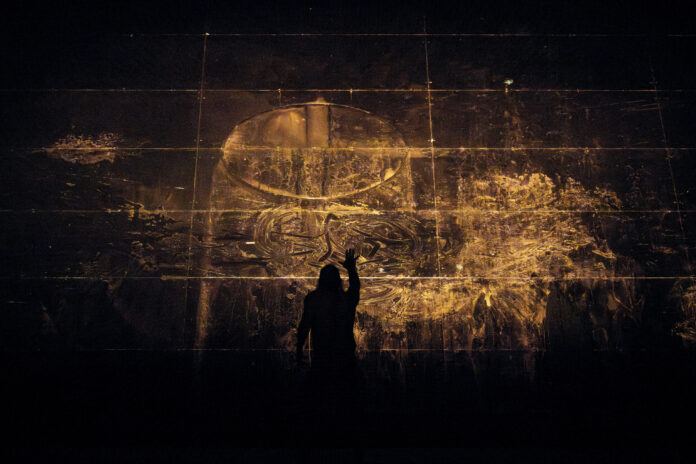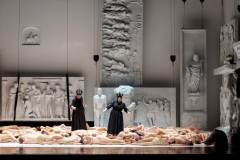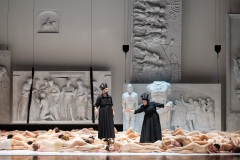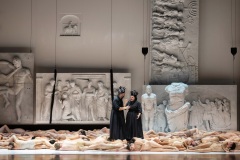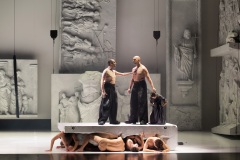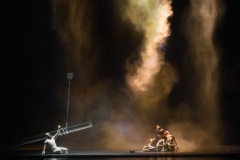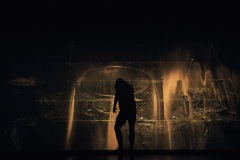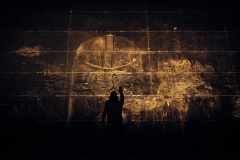Together attends the first part of what looks to be an extraordinary Ring cycle.
The curtain opens, a large, metal ring rolls on to the stage, it circles and circles and finally falls to the ground and with that Alain Altinoglu lifts his baton. So starts La Monnaie’s journey through Wagner’s Ring Cycle.
Das Rheingold is the prologue to Wagner’s four-part Der Ring des Nibelungen first performed as part of the cycle at Bayreuth’s purpose-built Festspielhaus in 1869. It encapsulates Wagner’s aesthetic and philosophical vision for what he preferred to term a ‘music drama’ and which he elaborated on in his essay on ‘Opera and Drama’ in 1851. La Monnaie has decided to take on the great cycle and will be performing Das Rheingold and Die Walküre this season and Siegfried and Götterdämmerung in the 2024-2025 season.
Altinoglu compares it to climbing Everest. The last time La Monnaie took the cycle on was in the 80s. The audience is in capable hands as Altinoglu and his orchestra know Wagner’s oeuvre well and have already interpreted Lohengrin (2018), Tristan und Isolde (2019) and the concert performance of Parsifal (2022). Altinoglu was the first French conductor after Pierre Boulez to conduct at Bayreuth. By venturing into the heart of Wagner’s magnum opus Altinoglu marks another decisive stage in the musical and artistic journey he started with the La Monnaie Symphony Orchestra musicians when he took up the reigns in 2016.
On this journey Romeo Castellucci will lead the direction of sets and costumes. He is no stranger to Brussels’ having made his opera debut here with Parsifal, and left a great impression with Orphée et Eurydice (2014), Die Zauberflöte (2018) and Requiem (2022). The mythological story that we are plunged into allows us to see some of our deeper impulses, but through a glass darkly.
We start in the depths of the Rhine with the Nibelung dwarf Alberich (Scott Hendricks) who tries to win the attention of the maidens in the primordial fluid. The maidens – Woglinde (Eleonore Marguerre), Wellgunde (Jelena Kordić) and Flosshilde (Christel Loetzsch) – say whoever wins the gold and forges it into a ring will gain power over the world, but must first renounce love and pleasure. Frustrated by his unsuccessful attempts to win over a maiden, Alberich curses love and steals the gold. Scott Hendricks’ performance is one of the most outstanding and is sometimes harrowing to watch.
In the next scene, Wotan (Gábor Bretz), is reproached by his wife Fricka (Marie-Nicole Lemieux) for promising to give Freia (Anett Fritsch), goddess of youth to the giants Fasolt (Ante Jerkunica) and Fafner (Wilhelm Schwinghammer) in return for their building a fortress for the gods. The two walk on the backs of a constantly wreathing floor made of humans, at times one feels a little concerned for those under foot. When the giants demand their reward, Loge (Nicky Spence), the god of fire, suggests an alternative payment: the ring Alberich has forged from the Rhinegold. The giants agree, and Wotan and Loge leave for the Nibelungs’ underground home. There are some parts of the staging that were confusing, but this was in part because our seats only permitted us to see some of the stage.
In the third scene in the kingdom of the Nibelungen, we see Alberich’s tyrannical control of his fellow dwarves, his brother Mime (Peter Hoare) makes a magic helmet that transforms its wearer into any form. Wotan and Loge trick Alberich into becoming a toad and take him to the surface of the earth.
In the final part Alberich relinquishes the gold and curses all around him. The giants demand the ring, now on Wotan’s finger who does not want to part with it. Erda (Nora Gubisch), the goddess of the earth, then appears and warns Wotan to separate from the ring and its curse. Freia, who is dragged onto the stage in a bin bag, is freed. Fasolt and Fafner argue violently, Fafner kills his brother and escapes with all the gold showing the curse of the ring is already taking effect. There are two large crocodiles hanging from the heavens, probably signifying the bad character of the giants.
As the Rhine maidens beseech Wotan to return the gold to them, he and the other gods leave by dropping backwards into a large black hole that mirrors the gold disc uncovered by the Nibelungen. They are on their way to Valhalla and – spoiler alert – over the course of three further operas we are going to discover that Erda was right and that the Rheingold will only cause misery.


